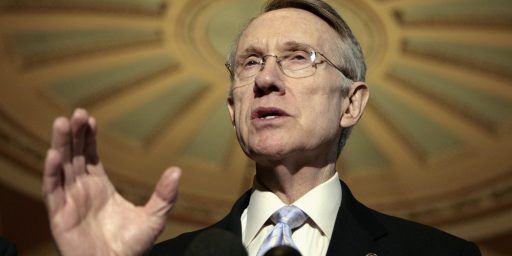House Republicans Waste A Day, Leaving Final Deal Up To The Senate
The House wasted a day yesterday, now it's crunch time.
After starting out the day with their own version of a plan to extend government financing and raise the debt ceiling for more than just a few weeks, only to see it fall into complete disarray by lunchtime, House Republicans spent most of the day yesterday behind closed doors trying to hammer together a deal that could actually pass the lower chamber. They continued on with this effort despite warnings from both the Senate and the White House that the measure, as had been leaked, was completely dead on arrival up to the point where it almost seemed like they were ready to put something on the floor late yesterday afternoon. Then, it all fell apart:
WASHINGTON — With the federal government on the brink of a default, a House Republican effort to end the shutdown and extend the Treasury’s borrowing authority collapsed Tuesday night as a major credit agency warned that the United States was on the verge of a costly ratings downgrade.
After the failure of the House Republican leadership to find enough support for its latest proposal to end the fiscal crisis, the Senate’s Democratic and Republican leaders immediately restarted negotiations to find a bipartisan path forward. A spokesman for Senator Harry Reid of Nevada, the majority leader, said Mr. Reid was “optimistic that an agreement is within reach” with Senator Mitch McConnell of Kentucky, the Republican leader.
With so little time left, chances rose that a resolution would not be approved by Congress and sent to President Obama before Thursday, when the government is left with only its cash on hand to pay the nation’s bills.
“It’s very, very serious,” warned Senator John McCain, Republican of Arizona. “Republicans have to understand we have lost this battle, as I predicted weeks ago, that we would not be able to win because we were demanding something that was not achievable.”
A day that was supposed to bring Washington to the edge of resolving the fiscal showdown instead seemed to bring chaos and retrenching. And a bitter fight that had begun over stripping money from the president’s signature health care law had essentially descended in the House into one over whether lawmakers and their staff members would pay the full cost of their health insurance premiums, unlike most workers at American companies, and how to restrict the administration from using flexibility to extend the debt limit beyond a fixed deadline.
Even so, the House speaker, John A. Boehner, Republican of Ohio, and his leadership team failed in repeated, daylong attempts to bring their troops behind any bill that would reopen the government and extend the Treasury’s debt limit on terms significantly reduced from their original push against funding for the health care law. The House’s hard-core conservatives and some more pragmatic Republicans were nearing open revolt, and the leadership was forced twice to back away from proposals it had floated, the second time sending lawmakers home for the night to await a decision on how to proceed Wednesday.
“We’re trying to find a way through it,” said Representative Greg Walden of Oregon, the chairman of the National Republican Congressional Committee, emerging from Mr. Boehner’s office to announce that no votes would be held Tuesday night.
When that happened, as National Review’s Jonathan Strong reports, the mood among House Republicans could not have been worse:
A key moment in the fight came when Heritage Action announced it was “key voting” against the bill. Support was already flagging, and the decision made up the minds of many members sitting on the fence.
“People are thinking about primaries, they really are,” says a GOP chief of staff.
(…)
The canceled vote was no Twilight Zone episode, however, but something far too familiar. Republicans eagerly compared it to the fiscal cliff’s famous “Plan B” episode, when Boehner brought lawmakers into a closed-door meeting in the Capitol basement, said the serenity prayer, and told them the vote was canceled.
The Christian rite accompanying legislative chaos today was Florida representative Steve Southerland’s rendition of “Amazing Grace” — “all three verses,” said Representative Michael Burgess (Texas) afterwards in amazement.
But Southerland is an undertaker by trade, and the song is normally sung at funerals. It’s hard not to see’s today’s failure as the death of the House GOP’s role, in at least this standoff.
What was particularly insane about the whole day yesterday is that, as soon as word came out that the House was struggling to work on its own ultimately doomed effort, the negotiations that had been going on since Monday between the Majority and Minority Leaders got put on hold to the point that there was absolutely not floor action in the Senate yesterday even though the body stayed in session until well after 9pm last night. It’s unclear why this was, some reports said that it was Senator McConnell who put the talks on hold, others say it was Senator Reid. In either case, it really doesn’t matter because it just contributed to yesterday’s theme which was that absolutely nothing got done while the shutdown made its way though Day 16 and the clock ticked down to the moment when the U.S. Government would officially run out of borrowing power, a time which is now mere hours away. There were several procedural reasons for the Senate to wait for the House to act first, including several that would’ve allowed the Senate to act on a more expedited basis than if a bill originates in that body, but when it became apparent by the early afternoon that the House wasn’t going to do anything at all, one wonders why Reid and McConnell just didn’t start talking again.
In either case, with the House GOP now officially sung out of the lead role in this saga with an appropriate funeral dirge, the ball is once again back in the Senate’s court:
Senate Majority Leader Harry Reid and Senate Minority Leader Mitch McConnell are finalizing a deal to avert a debt default and reopen the government, capping a frantic day that had Washington bracing for an economic crisis of its own making.
The deal is essentially done, sources say, as aides for the two leaders finished drafting the legislative language Tuesday night. The Senate adjourned at about 10 p.m. with no official word on a deal and will reconvene at noon Wednesday.
Reid and McConnell are expected to brief their respective caucuses Wednesday, hours before the country could fail to pay its bills for the first time in history. Cooperation will be needed from members of both parties in order to avoid default as well as to end the first government shutdown in 17 years. And a Senate plan will need to clear the House, which has struggled to pass any bill to raise the national debt limit.
It remains to be seen whether Washington can end a growing national crisis that has alarmed world leaders and spooked financial markets. But the fact that the two deal-making Senate leaders have restarted negotiations lifted the spirits of senators after the House shelved plans to move its own proposal that had drawn the scorn of the White House.
“Things look a lot better than they did several hours ago,” Sen. Chuck Schumer (D-N.Y.) said.
“In order to move this quickly tomorrow or as soon as possible thereafter we need the cooperation of members,” said Senate Majority Whip Dick Durbin (D-Ill.), who said a deal is “close.” “If they want to drag their feet, use every objection they can, it’s going to take a few days.”
Under the plan, a $986 billion government funding bill would reopen federal agencies until Jan. 15, and the debt ceiling would be lifted until Feb. 7. The two parties would be given the opportunity to cut a larger-scale budget agreement to slash future deficits as a bicameral conference committee would have until Dec. 13 to finalize such a deal.
Democrats won a major White House priority to ensure that the Treasury Department would still have the ability to use “extraordinary measures” to pay its bills in case Congress does not lift the debt ceiling by Feb. 7. Republicans would win a provision ensuring that recipients of Obamacare subsidies meet the required income levels.
And several sources said the deal drops a Democratic priority: No delay of an Obamacare reinsurance tax sought by labor unions, known as the “belly-button tax.” Back pay for federal workers furloughed by the government shutdown will also likely be included in the agreement, according to a Democratic aide familiar with the talks.
But the deal punts many of the major issues over deficits and spending, including over whether to lock in 2014 funding levels at $967 billion once the next round of sequestration cuts take effect in January.
In other words, we’re talking about the same kick the can down the road deal that I wrote about yesterday morning. It’s not perfect, there are things in it that both sides are going to dislike, but we’re at the point now where it’s the best that can be done without pushing things into the post October 17th zone when the big risk becomes the uncertainty of world financial markets. The question at this point is how fast it can get through Congress and whether there will be any roadblocks in its place.
The first test, of course, will be in the Senate where Harry Reid will no doubt attempt to use unanimous consent or the revised procedures adopted earlier this year to try to push the bill through quickly, possibly as early as some point late today. However as Businessweek’s Joshua Green noted earlier this week, one Senator, oh I don’t know let’s call him Ted Cruz, could either scuttle that entire process or slow it down significantly to the point where we might not see a final Senate vote until sometime on Saturday. Ultimately, just as in September, anything Cruz did would just be a delaying tactic and it would likely have less GOP support than it did the first time around. So, let’s assume that, eventually, this bill passes the Senate. Now, we have to move to the House. Yesterday we saw that the House GOP Leadership couldn’t even find enough support among their own caucus for a proposal that was far more favorable to the GOP than what the Senate is working on, so it’s highly unlikely that any Senate proposal will have the support of the “majority of the majority” in that body. This means that Boehner and Company will have to decide if they want to break the so-called, and largely mythical, “Hastert Rule” and put the bill on the floor, where it would likely only pass because of Democratic support and perhaps a minority of the votes in the Republican caucus. Conventional wisdom is that, at this point, that’s exactly what the leadership will do. What happens afterwards in terms of a potential civil war in the GOP Caucus will be a question for another day.
All of this could take one day, or it could take several days, which may or may not spook financial markets. If investors believe that things are headed in the right direction then they’ll likely withhold what might look like panic selling to allow the process to work itself out. That should happen in enough time for the Treasury to fudge over the fact that it can’t borrow for a day or three. However, if things get stalled and progress seems unlikely then we could see a replay of the market shock that caused the House to reconsider its initial rejection of TARP back in October 2008. In either case, we do actually appear to be nearly some kind of end game now. Of course, it also seemed like we were entering any end game at this time yesterday too and look what happened. If things go wrong again, I’m not sure what funeral dirge will be appropriate to end the day.







Anyone more concerned with keeping their job then actually DOING their job should be fired on the spot for gross incompetence. This bullshit has gone on long enough!
I suspect the debt default is still a couple of days away, even a week. Stock markets are positive and the sun will rise in the morning.
The real problem is the frequency of these “crises”. At some point, no one will take them seriously. In fact, seems like most of the public is already at that point.
It cannot be “up to the Senate” though. The Senate already passed a deal that would extricate us from this mess. Actually, they’ve passed at least two such bills (the original “clean” CR at $988B, and the very recent one with the gimmicky PPACA changes in it).
It remains the House that needs to get this done. Which, as we all know, could have happened a long time ago, if the Speaker would allow either one of the Senate deals to come to the floor. I think it’s fair to say that all of the Democrats would vote in favor, leaving only 17 GOP votes required for passage.
Once again, I just LOVE how the “OMG! Uncertainty!” argument has vanished down the memory hole. The GOP is in the middle of making our government the laughingstock of the developed world, and they think it’s True Patriotism.
House Republicans Waste
A DayEvery Day Leaving Final Deal Up To The SenateFTFY
Alternate Headline:
House Republicans Waste Over $2B, Accomplish Nothing In the Process
“Let’s ROLL!” No, wait a minute, “Amazing Grace, how sweet the sound, that saved a wretch, like ME….” We’ve come a long ways, baby.
And this is what this country has sunk to, trying to appease a 1/4 of the voting populace.
@C. Clavin: That’s called, “Fiscal Conservatism.”
Well Doug, you are definitely NOT the model for “both sides” at this stage, the WSJ sets the bar:
(I really hoped I’d wake up to a done-deal this morning, this is just ridiculous.)
Josh Barro hits the nail on the head:
What were Reid and McConnell thinking when they stepped aside to let the House take charge?
Suspending a Senate negotiation to let THIS House put together a deal is analogous to telling the fire department to wait while the owner tries to craft a bucket to fill with water. The current Republican House delegation is to deal making as salmonella is to uncooked chicken.